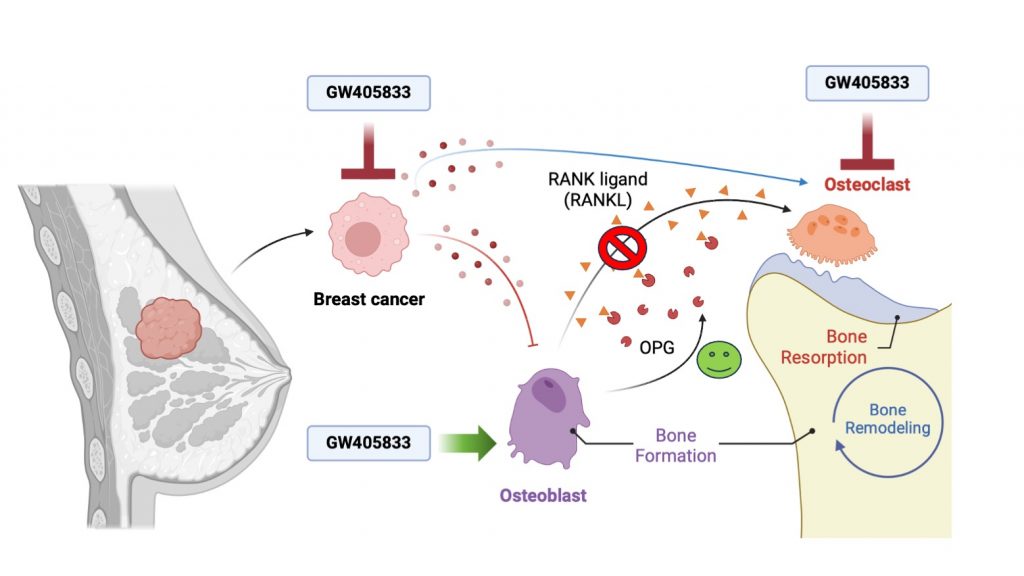
Breast cancer frequently metastasizes to bones, leading to debilitating osteolytic lesions. This occurs due to a disruption in the delicate equilibrium between bone formation by osteoblasts and bone resorption by osteoclasts. This study investigated the effects of GW405833, a cannabinoid receptor type 2 (CB2) agonist, on the complex interactions between breast cancer cells and bone cells, as well as its impact on breast cancer-driven osteoclast formation.
Our findings revealed that GW405833 effectively counteracted MDA-MB-231 breast cancer cell-induced death in UMR-106 osteoblast cells, simultaneously promoting UMR-106 cell viability. The underlying mechanism for these beneficial effects was elucidated within the study. GW405833 specifically reduced AKT phosphorylation in MDA-MB-231 cells, without affecting mTOR protein expression or its phosphorylation. Conversely, in UMR-106 osteoblasts, GW405833 triggered the phosphorylation of both AKT and mTOR proteins. Crucially, the protective effect of GW405833 on UMR-106 cell viability, when exposed to conditioned media from MDA-MB-231 cells, was reversed by an mTOR inhibitor. This highlights the critical involvement of the AKT/mTOR pathway in mediating GW405833’s inhibitory actions on the detrimental interactions between cancer cells and bone.
Furthermore, GW405833 demonstrated additional anti-cancer properties. It suppressed the enhanced invasion of breast cancer cells that was promoted by osteoblasts and reduced the expression of invasion-related proteins in both cell types. The agonist also decreased the levels of osteoclastogenic factors induced by MDA-MB-231 conditioned media in UMR-106 cells and effectively inhibited MDA-MB-231 conditioned media-enhanced osteoclastogenesis in RAW 264.7 cells. Collectively, these results underscore the significant therapeutic potential of cannabinoid receptor agonists like GW405833 for the treatment of breast cancer bone metastasis and its associated skeletal complications.
มะเร็งเต้านมมักแพร่กระจายไปยังกระดูก ทำให้เกิดความเสียหายของกระดูกเนื่องจากความไม่สมดุลระหว่างการสร้างและการสลายกระดูก การศึกษานี้มีวัตถุประสงค์เพื่อศึกษาผลของ GW405833 ซึ่งเป็นสารกระตุ้นตัวรับแคนนาบินอยด์ชนิดที่ 2 (CB2) ต่อปฏิกิริยาระหว่างเซลล์มะเร็งเต้านมและเซลล์สร้างกระดูก ตลอดจนผลกระทบต่อเซลล์สลายกระดูกภายใต้อิทธิพลจากมะเร็งเต้านม
ผลการศึกษาแสดงให้เห็นว่า GW405833 ช่วยปกป้องเซลล์สร้างกระดูก UMR-106 จากการถูกทำลายโดยเซลล์มะเร็งเต้านม MDA-MB-231 โดยกลไกเบื้องหลังนี้เกี่ยวข้องกับกระบวนการ AKT/mTOR: GW405833 ลดการกระตุ้น AKT ในเซลล์ MDA-MB-231 ในขณะเดียวกันก็กระตุ้น AKT และ mTOR ในเซลล์ UMR-106 นอกจากนี้ การยับยั้ง mTOR ยังทำให้การทำงานของ GW405833 ลดลง ภายใต้การสัมผัสกับสารจากเซลล์ MDA-MB-231 ซึ่งเน้นย้ำถึงบทบาทของกระบวนการ AKT/mTOR ในการทำงานของ GW405833 ต่อปฏิกิริยาระหว่างมะเร็งกับกระดูก
ยิ่งไปกว่านั้น GW405833 ยังยับยั้งการรุกรานของเซลล์มะเร็งเต้านมสู่เซลล์สร้างกระดูก และการแสดงออกของโปรตีนที่เกี่ยวข้อง นอกจากนี้ยังลดความสามารถของเซลล์ UMR-106 ในการกระตุ้นการสลายกระดูก และยับยั้งการสร้างเซลล์สลายกระดูกที่เพิ่มขึ้นโดยสารสื่อจากเซลล์มะเร็ง ในเซลล์ RAW 264.7 การศึกษานี้เน้นย้ำถึงศักยภาพในการรักษาของสารกระตุ้นตัวรับแคนนาบินอยด์สำหรับการรักษามะเร็งเต้านมที่แพร่กระจายไปยังกระดูกและภาวะแทรกซ้อนที่เกี่ยวข้องกับกระดูก
Reference
Inson I, Chutoe C, Kanjanapipak J, Lertsuwan K. Cannabinoid Receptor Type 2 Agonist, GW405833, Reduced the Impacts of MDA-MB-231 Breast Cancer Cells on Bone Cells. Cancer Medicine, 2025, 14(4), e70709.
Doi: 10.1002/cam4.70709.
Relevant SDGs

BC investigator

